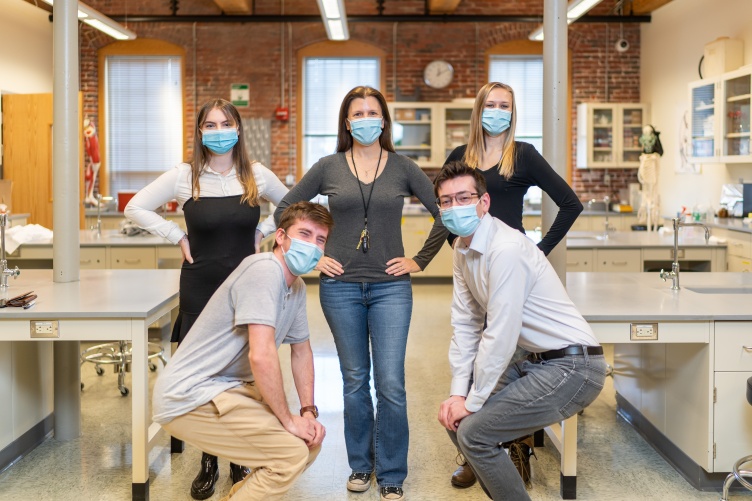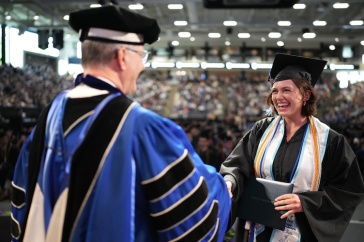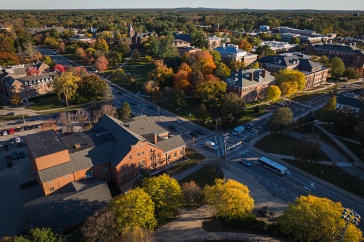
Dr. Sue Cooke, center, with members of Team Cooke, a group of UNH Manchester students whose experiment was selected by NASA to send to the International Space Station.
Dr. Sue Cooke ’94, ‘04G has been part of the UNH community for more than two decades. After earning a B.S. in Marine and Freshwater Biology and a Ph.D. in Zoology on the Durham campus, Cooke joined UNH Manchester as an adjunct instructor of biological sciences in 2013. Her knowledge and enthusiasm have made her a standout teacher and an integral part of faculty, which led to her appointment as a full-time lecturer of biology in 2018.
Despite teaching challenging subjects like anatomy and physiology, Cooke makes the content exciting. She designs her courses not only to appeal to students’ interests, but also to develop skills and knowledge that apply to the real world. Her efforts to motivate, challenge and inspire students to succeed in and out of the classroom earned her the 2018 Adjunct Excellence in Teaching Award.
Cooke serves as faculty advisor for the NoMADS project, an experiment on antibacterial resistance in space by a group of UNH Manchester students that was selected by NASA to go to the International Space Station. She was the first faculty member from New Hampshire to train with the Small World Initiative, an innovative program that encourages students to pursue careers in science while addressing a worldwide health threat – superbugs and the diminishing supply of effective antibiotics. Through this initiative, she developed a course on microbes and microorganisms at UNH Manchester that led to the development of her research program and the NoMADS project.
Cooke’s doctoral work focused on the behavior and physiology of the American lobster, specifically the effects of temperature on their physiology and seasonal movement patterns into and out of the Great Bay Estuary. An avid environmentalist, Cooke enjoys working with students to raise awareness of the many challenges facing our planet.
In addition to UNH Manchester, Cooke has also taught at Rivier College, St. Joseph’s School of Nursing, Southern New Hampshire University, New England College, Manchester Community College and Northern Vermont University.
What do you like best about your job?
I love the people! The students at UNH Manchester are hardworking and actively involved in their educational experiences. The faculty I get to work with are dedicated and supportive, and all of the staff are friendly and helpful.
Tell us your favorite:
- Manchester restaurant: The Farm
- New Hampshire destination: Anywhere near the ocean!
- Book: Last Chance to See by Douglas Adams
- Movie: Most anything sci-fi or with superheros like the Star Wars series or Marvel movies.
- Childhood book: The Tawny Scrawny Lion
- Childhood TV show: M*A*S*H
What are your hobbies?
Running races with my daughter, going to trivia nights, gardening, sewing, cooking/baking/canning and reading.
Best vacation ever?
Probably when I toured around Scotland with my husband—but my favorite place to go on vacation over and over is Key West!
We’d be surprised to know that…
I’m a major Parrothead (Jimmy Buffett fan) and have been to over 20 of his concerts!
Which 3 famous people, living or dead, would you want at your fantasy dinner party?
E.O. Wilson, Douglas Adams and Jimmy Buffett.
As a child, what did you wish to become when you grew up?
I always wanted to be a veterinarian because I love animals. But then I realized I’d be working more for their owners than the animals themselves, and that wasn’t as appealing!
Interested in biology or medicine?
Learn more about UNH Manchester's biological sciences program, which focuses on hands-on learning and offers specialized areas of study for the future you want. LEARN MORE
















































